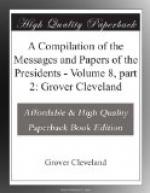But it appears to have been revived upon principles which set public order at defiance and place the peace of the United States in the discretion of unauthorized individuals. The means already deposited in the different departments of Government are shewn by experience not to be adequate to these high exigencies, although such of them as are lodged in the hands of the Executive shall continue to be used with promptness, energy, and decision proportioned to the case. But I am impelled by the position of our public affairs to recommend that provision be made for a stronger and more vigorous opposition than can be given to such hostile movements under the laws as they now stand.
GEORGE WASHINGTON.
UNITED STATES, May 21, 1794.
Gentlemen of the Senate and of the House of Representatives:
I lay before you in confidence sundry papers, by which you will perceive the state of affairs between us and the Six Nations, and the probable cause to which it is owing, and also certain information whereby it would appear that some encroachment was about to be made on our territory by an officer and party of British troops. Proceeding upon a supposition of the authenticity of this information, although of a private nature, I have caused the representation to be made to the British minister a copy of which accompanies this message.
It can not be necessary to comment upon the very serious nature of such an encroachment, nor to urge that this new state of things suggests the propriety of placing the United States in a posture of effectual preparation for an event which, notwithstanding the endeavors making to avert it, may by circumstances beyond our control be forced upon us.
GEORGE WASHINGTON.
UNITED STATES, May 26, 1794.
Gentlemen of the Senate and of the House of Representatives:
The commissioners of His Catholic Majesty having communicated to the Secretary of State the form of a certificate without which the vessels of the United States can not be admitted into the ports of Spain, I think it proper to lay it before Congress.
GEORGE WASHINGTON.
UNITED STATES, May 27, 1794.
Gentlemen of the Senate:
The Executive Provisory Council of the French Republic having requested me to recall Gouverneur Morris, our minister plenipotentiary in France, I have thought proper, in pursuance of that request, to recall him. I therefore nominate James Monroe, of Virginia, as minister plenipotentiary of the United States to the said Republic.
I also nominate William Short, now minister resident
for the United
States with Their High Mightinesses the States-General
of the United
Netherlands, to be minister resident for the United
States to His
Catholic Majesty, in the room of William Carmichael,
who is recalled.
GEORGE WASHINGTON.
UNITED STATES, June 2, 1794.




